ALICE: Our expert speaker, Dr. Shamini Jain, is the founder and C.E.O. of CHI, the Consciousness and Healing Initiative.
JAIN: my name is Dr. Shamini Jain. And my whole life, I would say I've been a very curious person. I was born and raised in the South in South Carolina and born as an East Indian in the Jain tradition. So early on, I was exposed to lots of philosophies and thinking around spirituality. All my friends were Baptist Christian. As I said, I grew up in the Jain Tradition, and I went to school like everybody else. And I started realizing pretty early in life that we were kind of being implicitly taught that our spiritual life was very different from our education life. And we understand why we have those splits. But as I got deeper into science and started exploring the nature of consciousness, I started having all these questions about why it was safe for us to explore certain areas of science and health. And yet when we got to the point of exploring conscious experience, the nature of healing, things like that, some of the things that I was learning about in the East Indian background and other spiritual traditions just seemed to be off-limits.
ALICE: Dr. Jan, a global, life-long learner, was motivated to create a collaborative accelerator, to bring together diverse perspectives, and forward the science and education of healing.
JAIN: And that was really surprising to me. I didn't really understand why we had this schism, if you will, between science and spirituality. And so I sought out to say let's bridge these systems of knowledge, let's bridge these systems of healing, because our medical system is broken. To a large degree, it's broken. Certainly, it needs to be evolved in many ways. And we have made incredible advances in many ways, and yet we've sort of left behind wisdom in many ways, as well. So that's a little bit about my story and what motivated me to create the consciousness in healing initiative.
ALICE: CHI, pronounced as "chi", is the Consciousness and Healing Initiative created by Dr. Jain.
JAIN: CHI is collaborative. Our Consciousness and Healing Initiative is a collaborative of scientists and healing practitioners and educators, but also of organizations that have been forwarding this work for a long time.
ALICE: Working to bridge science and spirituality, knowledge and healing. What do we mean by consciousness and healing?
JAIN: especially in the medical and scientific system because we're so used to thinking about things in the realm of what we call pathogenesis. That is diagnosing a disease and treating it. So a lot of times, we think healing is curing, which means healing is about I have a sprained ankle and I want someone to do Reiki on it to make it better. OK, there's nothing wrong with that. That's great. That could probably happen. It often does happen.
But healing to me is much more than that. And in talking with healers across the world, one of the things that I've noticed is that at its core, no matter who you're talking to, what healing tradition they come to, they're all basically saying the same thing, which is healing is reuniting one with your own spirit. Whether we call that your own soul, whether we call that God, whether we call that the universe, nature, there are many ways of describing it. But healing is basically the restoration, the process, of restoring harmony to ourselves completely, not just on the physical level but on the emotional level, on the social level, and on the spiritual level. But the driving force here is really that reunification with your spiritual nature, with your true self, unencumbered, that part of your consciousness that is beyond what you've been conditioned to think that you are.
ALICE: Wow, healing is part of learning about ourselves.
JAIN: As human beings, we don't want to suffer. So we're always looking for a way out. We're looking for a way to ease our suffering. And so we kind of want to believe healing means that it's going to reduce my suffering. Well, in a way, it does because as we know, what is the saying? Pain is inevitable, suffering is optional. Something like that, right?
So we can learn to sort of be with where we are through the healing process and we can sit with things as they are. We can notice the impermanence. We can celebrate the impermanence in a strange way instead of fighting against it and saying, I don't want this. I want to get healing because I don't want this. I mean, nobody wants cancer. Nobody wants chronic pain. We don't want those things. So there's nothing wrong with wanting to rid ourselves of a disease. But when we come to a place of just being able to be with our spirit where we are now, that's the power of the healing process. And then all of the sudden, we might notice, oh, I have pain, but it's not bothering me as much. I'm actually able to notice other things in my life. I'm actually able to feel joy along with my pain. I'm living a much more full life. That's sort of the magic of the healing process.
ALICE: healing is more than what happens to each of us on a personal level – it’s about connectedness.
JAIN: We're all connected with each other. And so when we began to realize this through our healing process, then the world looks very different because harmony isn't just something that happens in my body or even just in my relationships. It's my connection with the earth, it's my connection with society, it's recognizing that when I look at another person, even if they come from a very different place than I've come from, their upbringing is different, their culture is different, that there's no difference, really, between me and that person, that we're all part of the same beautiful tapestry of life. And we can grow and appreciate each other.
So the healing process, when we start looking at it on the macro scale, once we've sort of dealt with our own suffering and our own trauma a little bit so that we can see outside of ourselves a little bit better, then we start recognizing the joy in interpersonal connection, the joy in harmony, the joy in diversity, and the joy in sustainable stewardship of our planet. And this is something that, again, the indigenous wisdom holders have taught us from the beginning. Healing is about the restoration of harmony with not only ourselves, but with our planet, with nature, with understanding how nature affects us.
We are nature. We are made up of nature. We are made up of the elements. This is what all of the indigenous wisdom teachings teach us. So then we begin to observe or with our spirit nature, which is inrestrictably connected with the earth. So we begin to notice the patterns. There's all of these things that seem magical that trackers and other folks do in the indigenous traditions. Well, they're just really observing with deep, subtle awareness.
So as we do this work in the healing profession and in our own self-healing, then we begin to see those interconnections really deeply. And that just naturally makes us have better choices. Then it's sort of like, OK, do I need to buy all of that plastic that goes in the landfill? Is there a better choice here? How are my eating habits affecting the planet? How are my behaviors affecting the planet? Because now we can feel her. We're part of her.
ALICE: how, if we are awakened to our healing potential, we can see the interconnectedness of all & we can create the world we want to see
JAIN: in science and medicine, in the Western world, it's sort of been very myopic. It's kind of been one way of thinking and we've kind of not really taken into account the wisdom of the cosmology from indigenous tradition.
So as we begin to bring in the more holistic cosmologies, which are necessarily rooted in healing, then our perspective changes. Our understanding of reality and what it is changes. Our relationships change as a result. And we begin to create that world that we want to see. So if we are awakened to our healing potential, then that means that we're awakened to our interconnection, the diversity and celebrating the diversity of life, and knowing that everything that we do, everything that we think, everything that we say is affecting everything around us because we're not separate.
And that's empowering because we get to create the world we want to see. We get to create that harmonious world. We get to celebrate each other. All of this is possible.
ALICE: Energy is all around us – fields of energy and information, our Biofield!
JAIN: One of the questions that we have is about whether healing as we've talked about it, energy healing, what people call energy healing, subtle energy healing, is actually informational healing. And why is this distinction important? Because energy has a very specific definition, OK? So by its very nature, some of the things that we are seeing in the healing profession, like the non-local healing that I mentioned before, the fact that a healing practitioner can affect someone's physiology at a distance.
That doesn't jive with our understanding of what we call energy, right? So there are other things that happen, too, in terms of even when the healer is in the same room with a patient, sometimes a patient will have an extraordinary spiritual experience where they might experience, for example, ancestors, a grandmother, or a grandfather literally being there in spirit form guiding the process. Is that energy or is that information?
And when we're looking at healing from a distance, we can't quite say that this is electromagnetic in nature. So there has to be something else that's happening. And this is where we get into exploring whether or not these fields of what we call energy and information are both having effects. So there could be this subtle energy that is measurable in some ways. Maybe some of it is electromagnetic. Some of it may not be electromagnetic. It may be in the form of what people call scalar waves and other descriptions, torsion fields and things like that, which are subtle but are still kind of described as energy in some ways.
And then there's the informational aspect of it, too, which suggests that this is beyond measurement. It may be beyond measurement. At least at this point in time, it may be beyond measurement. We always kind of want to measure everything. As scientists, we do. It's like, well, I can't believe it unless I can replicate it, I can measure it. Well, that's great. That's absolutely part of science. We do want to do that.
But if we're seeing an effect over and over and yet we still can't quite deduce the mechanism, does that mean the effect isn't there or does that mean that we just don't quite know how to measure the mechanism? So this is really important because a lot of times, the field, the funding, the support for the field, the ability to go forth and do more studies and a very promising area becomes limited because we don't "understand the mechanism."
ALICE: Could that mechanism be us, our biofield? And the experiences we feel during our healing process?
JAIN: We might want to get a little bit more comfortable with studying informational effects by actually asking the person what they're experiencing. This is called mixed methods research, where we integrate both what we call the qualitative aspects of a person's experience along with the quantitative.
The other way we could do it is just to ask people what their experiences are like so we can get a better understanding of what we're calling information transfer during the healing process.
ALICE: Wow, healing as information transfer. I, for one, am excited to hear more about the outcome of the studies that CHI and others are doing to help us harnessing our own healing, and perhaps that of our planet.
Which leads me to one more question for today’s expert, Dr. Shamini Jain, on interconnectedness and information: I would like to know, Are we all stardust?
JAIN: I absolutely love the question. I have to share with you. One of my last talks for this year in 2020 that I gave in person in February before coronavirus hit was actually sharing the lyrics from a song that I think we all know, which is Woodstock, written by Joni Mitchell. And what does it say? We are stardust, we are golden, we are billion-year-old carbon. And we've got to get ourselves back to the garden.
We're certainly more than just our physical bodies.
ALICE: Thanks to today’s expert, Dr. Shamini Jain, the founder and C.E.O. of CHI, the Consciousness and Healing Initiative, for explaining healing and consciousness, the connectivity of all humans and the energy we share.
Again, we learned that Yes, we are, Bioenergetic beings!
LINKS:
Dr. Shamini Jain: http://www.shaminijain.com
CHI, the Consciousness and Healing Initiative: https://www.chi.is/
Tuning Into Frequencies







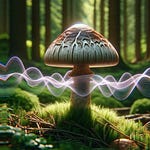
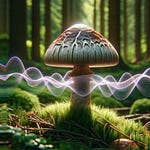
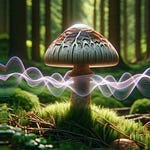
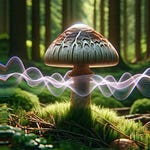
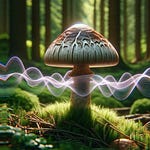
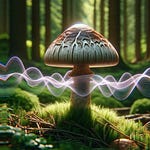
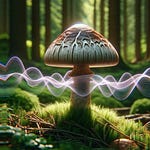
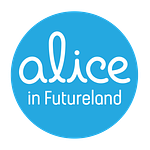
Consciousness & Healing with Shamini Jain